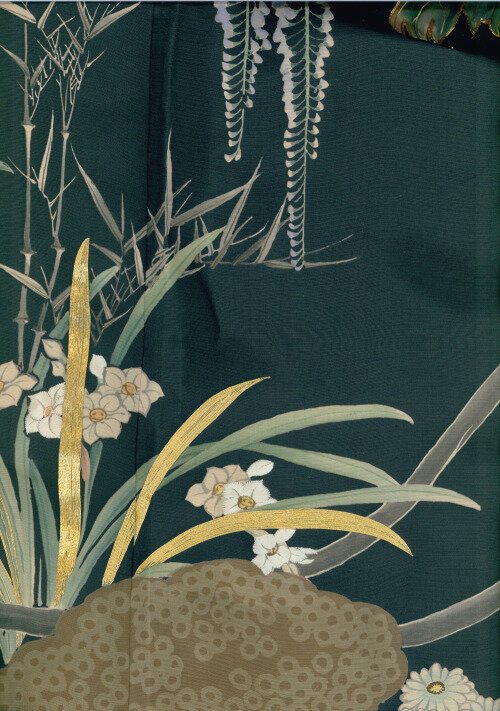Taisho Uchikake, Taisho period (1912-1926), Japan
Taisho Uchikake, Taisho period (1912-1926), Japan. The Kimono Gallery.
This opulent and wonderful Taisho-era uchikake (bridal robe) was obviously made by exceptionally talented artist and craftspeople, as the design and yuzen-dyeing are superb. This very lightweight silk wedding garment has much silk and metallic embroidery mixed with this yuzen-work. ‘Hana guruma’ in Japan translates in English to 'flower cart’. Historically, ox-carts also have proven to be popular decorative motifs, especially on women’s textiles. Ox-carts often appear on bridal overkimono robes, perhaps drawing a parallel between the grace and elegance of the bride and the gentility and refinement thought to have characterized the lives of the nobility during the Heian Period a thousand years ago, regarded as the golden age of Japanese culture. Ox-carts, too, may have been the inspiration for the curious motif in art of the cart filled with flowers of the four seasons. Paintings and other depictions of flower carts inspired real carts for flower arrangement, not the other way around.
(Source: thekimonogallery.com)

/https%3A%2F%2Fprofilepics.canalblog.com%2Fprofilepics%2F1%2F0%2F100183.jpg)
/https%3A%2F%2Fstorage.canalblog.com%2F03%2F02%2F119589%2F96711876_o.jpg)
/https%3A%2F%2Fstorage.canalblog.com%2F11%2F31%2F119589%2F94773502_o.jpg)
/https%3A%2F%2Fstorage.canalblog.com%2F20%2F83%2F119589%2F94772815_o.jpg)
/https%3A%2F%2Fstorage.canalblog.com%2F26%2F72%2F119589%2F75604929_o.jpg)
/https%3A%2F%2Fstorage.canalblog.com%2F59%2F60%2F119589%2F26458628_o.jpg)






/http%3A%2F%2Fstorage.canalblog.com%2F79%2F08%2F119589%2F129532429_o.jpg)
/http%3A%2F%2Fstorage.canalblog.com%2F51%2F46%2F119589%2F126931269_o.jpg)
/http%3A%2F%2Fstorage.canalblog.com%2F87%2F49%2F119589%2F126931074_o.jpg)
/http%3A%2F%2Fstorage.canalblog.com%2F05%2F95%2F119589%2F126875799_o.jpg)